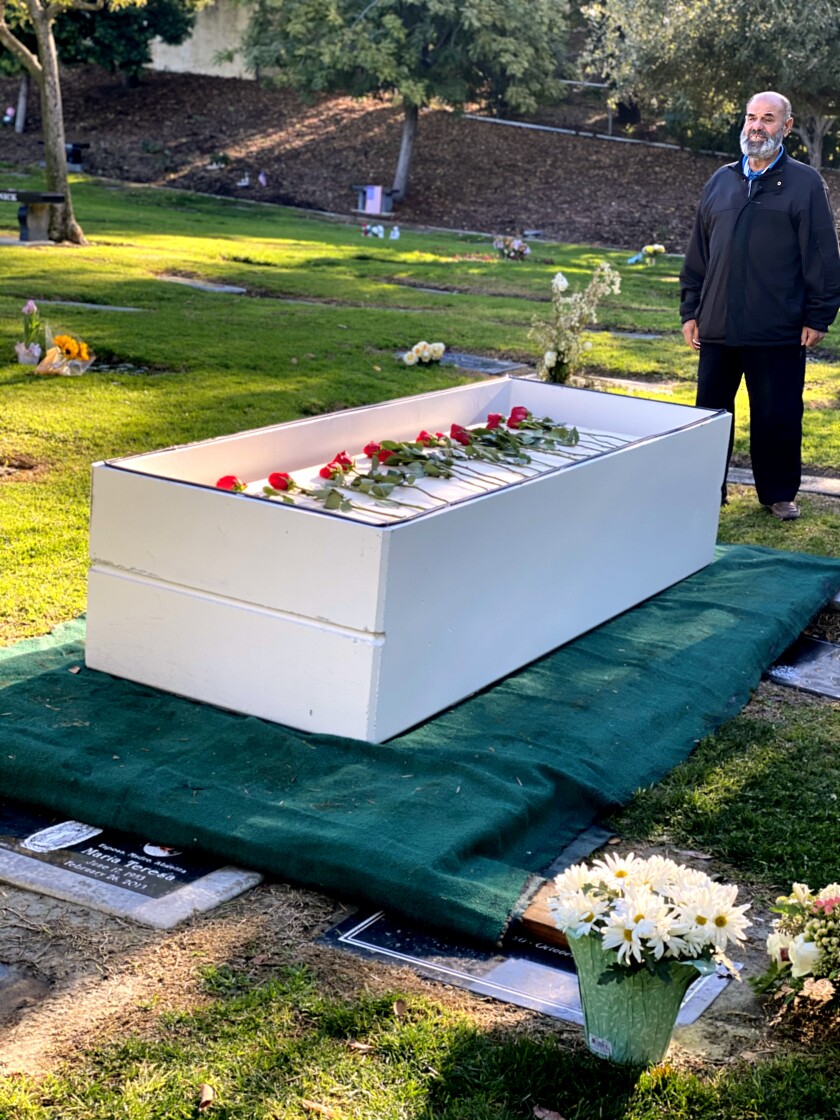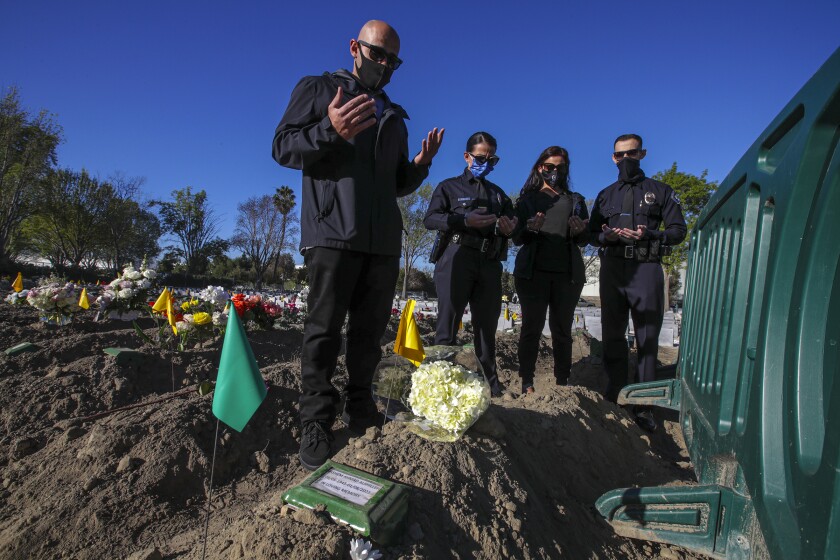[ad_1]
Mahmoud and Rayah Shilleh walked silently across the Islamic Garden at Westminster Memorial Park toward the six-day-old grave of their father, Hashem Ahmad Alshilleh.
They passed row after row of identical tombs — plots ringed by concrete curbs and covered in white stones, with raised headstones that serve as the resting place for over 1,500 Muslims.
“This is all my father’s legacy,” said Mahmoud, a 25-year-old Corona Police Department officer, as he waited for his siblings to arrive. “It’s just humbling.”
For over 30 years, Alshilleh helped to bury a generation of Southern Californian Muslims. The Riverside resident washed and shrouded the corpses of men per Islamic customs and drove the bodies of men and women to cemeteries from Rosamond to Victorville, San Diego to Orange County.
The slight but strong truck driver stayed with each body until it was lowered into the ground. He would then climb down to ensure the deceased lay on his or her right side, facing toward Mecca, to await the Day of Resurrection. Afterward, Alshilleh emerged to deal with the living. He broke up arguments, offered gravesite prayers, did whatever grieving families asked of him.
He never charged for his services, relying only on donations. In many cases, he’d pool those funds to pay for the funerals of strangers, Muslims and not.
His five children — two police officers, two construction contractors and a nurse — knew their father was an important part of the local Muslim community. But it wasn’t until Alshilleh passed away Jan. 8 at 75 that they realized the magnitude of the man.
“We knew he was a great guy, but talking to people, that’s how we found out he was a legend,” said his oldest son, 33-year-old Ahmad.
“Baba stayed quiet about who he was,” said Ahmad’s twin sister, Ayah Shilleh-Velazquez. “We knew what he did, but he just didn’t boast about it.”
“I received over 300 calls from around the world when my dad died,” added Mahmoud. “The messages were all the same. ‘He buried my mother-in-law. He buried my son. He buried my father, my friend.’”

Hashem Ahmad Alshilleh came to his vocation by necessity. As a teenager, he took it upon himself to prepare his father’s body for burial after no one else was available. After that, he promised to God that he would provide the same service to others.
(Mahmoud Shilleh)
“There’s no Muslim family in Orange County or the Inland Empire who hasn’t directly benefited from Abu Ahmad’s help,” said Hussam Ayloush, referring to Alshilleh with an Arabic honorific meaning “father of Ahmad.” The executive director of the Council on American-Islamic Relations’ Los Angeles office estimates he has seen hundreds of funerals, “and Abu Ahmad was the person helping in the overwhelming majority of them.”
Including those of all his relatives.
Alshilleh came to his vocation by necessity. When he was a teenager, his father died suddenly, and no one wanted to prepare his body. So Alshilleh, as the oldest son of Palestinian refugees in Jordan, took it upon himself to do the task. He asked elders and imams and anyone who might know something, anything.
“After that,” said his son Mohammad, “Baba promised God he would do it for others forever.”
He continued his charity in the United States — first in New York City, and then Riverside, where he settled in 1993 and promptly volunteered at mortuaries in the Inland Empire. Muslim migration to Southern California was rising, and the funeral industry needed people like Alshilleh. The more bodies he washed, the better and more knowledgeable he became, until he was widely acknowledged as the best of the best.
On this day, the last two rows of graves that the Shilleh siblings passed were little more than dozens of mounds of dirt. Framed papers topped each to denote the departed. So many Muslims in the region have died of COVID-19 these last couple of months that there’s simply not enough time right now to fully finish new tombs.
One of those victims was Alshilleh. His grave is one plot over from the last person he buried.
“His good deeds will always protect his family,” said Isa Farrah, who worked alongside Alshilleh at his father’s Olive Tree Mortuary in Stanton since he was a teenager. He greeted the Shilleh siblings and offered his condolences anew. The 30-year-old looked around. “Look at how many people benefited from him. This is what he lived and died for.”
Farrah then paraphrased the Quranic verse that Muslims recite at every burial:
From the earth, we were created.
To the earth, we shall return.
From the earth, we shall rise again.
He said it as everyone jostled for space next to a fence that temporarily abutted Alshilleh’s grave. Next to it, three freshly dug burial plots awaited coffins for later that day.
Goulade Farrah, owner of Olive Tree Mortuary and funeral director for the Islamic Society of Orange County, met Alshilleh 16 years ago. The two became colleagues and fast friends.
“Abu Ahmad was one of those God-sent people,” Farrah said. “I thought I knew what I was doing, but seeing this guy — he was a university.”
Farrah recalled multiple times when family members of the dead would complain to him that Alshilleh wasn’t honoring the specific funeral customs of their home countries. “So you’d hear them doing a phone call to someone who they thought knew better,” Farrah said, awe in his voice, “and they’d tell the caller, ‘No, [Alshilleh] is doing it right. Leave him alone.’”
Alshilleh eventually left his truck-driving job to prepare bodies full time as demand grew. He taught his sons the basics: Start the ritual bath by washing the right hand three times. Wrap the body in three simple white cloths. Wear personal protective equipment at all times. Be mindful of how to place arms — Sunnis want corpses with their arms crossed over the midsection, while Shiites prefer them on the side.
“He would always tell me, ‘Don’t ever fear death, son,’” said Mahmoud, who apprenticed under him for two years, “‘because it’s all going to be us one day.’”
His children tried to slow down their father as the years passed, but Alshilleh always waved them off. “Baba would say it wasn’t work for him,” said Rayah, a Los Angeles police officer. “That it was a blessing.”
Mohammad Shilleh, left, Rayah Shilleh, Ayah Shilleh-Velazquez and Mahmoud Shilleh offer prayers at the grave of their father.
(Irfan Khan / Los Angeles Times)
But they saw a change in him as the coronavirus swept through Southern California. He could no longer enter burial plots to position bodies toward Mecca. He couldn’t even bathe them with water anymore, instead relying on a different type of purification called tayammum which involved dirt rubbed over the deceased — but now, it had to be done over the body bag.
By the fall, Alshilleh would leave home at 4 a.m. and often wouldn’t return until nine at night.
“He just looked so tired,” Mahmoud said. “He’d say, ‘Everyone I’m burying, it’s all COVID.’”
On Dec. 21, Rayah received a call from the Ontario Police Department that they had found her father disoriented and wandering on the street. He had just finished work and had a bad cough. It was COVID. He died three weeks later.
Goulade Farrah prepared Alshilleh’s body, with Mahmoud in attendance. “He was like a father to me,” Farrah said. “It was difficult trying to hold my emotions, because I wanted to do my best for Abu Ahmad.”
Farrah rubbed dirt on Alshilleh over the body bag, reciting the proper prayers. And he made sure, of course, to position his mentor toward Mecca, like Alshilleh had made sure to do with the thousands upon thousands of faithful under his care.
Over 40 people made sure to show up at Alshilleh’s funeral, socially distant, to fulfill a hadith that stated that if someone had that amount of people praying for them at their burial, Allah would accept their intercession.
One of those was Ayloush.
“My biggest regret as an activist is that we didn’t get to honor Abu Ahmad and recognize him while he was alive,” the CAIR L.A. director said. “It breaks my heart. These pioneers are disappearing, people who were selfless and gave with no expectations when the community needed them the most.”
Alshilleh’s children plan to start a nonprofit in his memory to pay for the funerals of people who can’t afford them, even though they know their father would’ve frowned at any recognition.
“He never called it work,” Ayah said. “He never did it as a source of income. He would always tell us the same thing: ‘I’m not doing it for money. I do it for God.’”
[ad_2]
Source link
